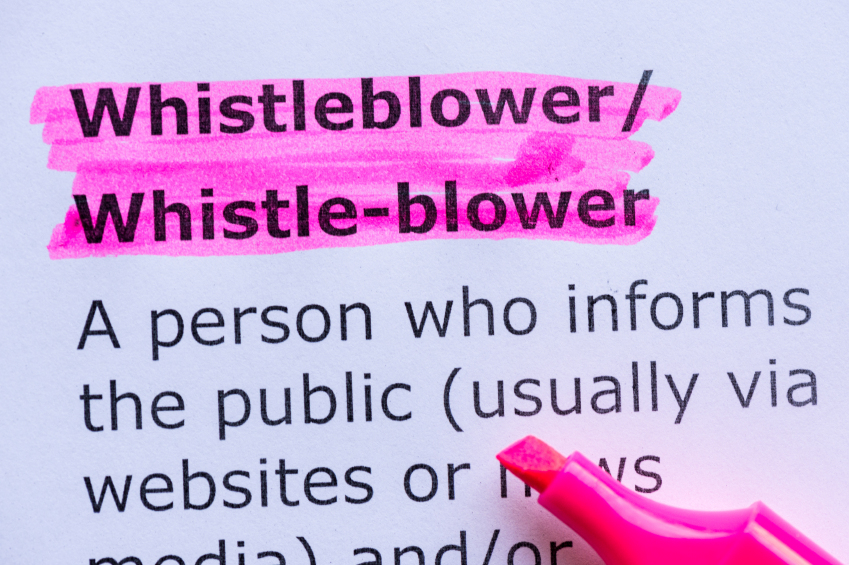 Doing the right thing isn’t always easy. Many employees witness illegal or unethical conduct in their workplace, few are brave enough to report these actions to higher management or a government agency. Some of those who take a stand end up being punished by management as a result. Depending on the circumstances, those employees may have legal rights that the Spiggle Law Firm can protect.
Doing the right thing isn’t always easy. Many employees witness illegal or unethical conduct in their workplace, few are brave enough to report these actions to higher management or a government agency. Some of those who take a stand end up being punished by management as a result. Depending on the circumstances, those employees may have legal rights that the Spiggle Law Firm can protect.
Many Laws Protect Employees Who Report Wrongdoing by Their Employer
The False Claims Act covers disclosures of fraud upon the federal government and Whistleblower Protection Act protects federal employees after disclosing illegal or improper government activities. Virginia state laws protect whistleblowers as well, including its civil rights laws and the Virginia False Claims Act.
- Generally, the protections occur after a person reports a violation of law internally or to a government agency, files a lawsuit concerning the matter, testifies about the matter in a legal proceeding or oppose something that the person reasonably thinks is illegal by refusing to perform some function or task.
- If a lawsuit is filed by the employee because of illegal retaliation , the plaintiff would need to be show protected activity, the employer’s knowledge of those acts and the employer taking actions against the employee (such as firing or demoting) in response, which caused harm.
- Damages recoverable through a legal action may include back pay, front pay, reinstatement and other damages.
Under federal law, there are civil rights and anti-discrimination laws that make it illegal for an employee to be discriminated against for seeking protection of these laws, testifying at such proceedings or aiding the investigation of such charges. There are similar federal protections for employees who report anti-trust, environmental, employment discrimination, labor law, toxic waste, tax law, clean water and equal pay law violations.
Federal False Claim Act and Qui Tam Fraud Cases Protect the Federal Taxpayer
The False Claim Act (FCA) is one of the better known federal whistleblower laws. The FCA allows a private individual (the relator) who knows about past or present fraud on the federal government to sue on behalf of the government to recover stiff civil penalties and triple damages in legal actions known as qui tam cases. They can include a wide range of cases involving defendants accused of defrauding the government.
- Amedisys Inc., one of the country’s largest home-nursing providers, will pay $150 million to settle U.S. claims that Medicare was falsely billed and that the company was involved in improper financial relationships with referring physicians.
- Teva Pharmaceutical Industries Ltd. will pay the U.S. and Illinois $27.6 million to resolve allegations it illegally paid a doctor to prescribe a dangerous antipsychotic drug to patients in federal care programs.
- McKesson Corporation agreed to pay $18 million in an FCA case involving allegations it falsely claimed vaccines it shipped were kept at a proper temperature
Most forms of intentionally or knowingly cheating are considered fraud. It’s a fraud when,
- Someone lies in order to get money for which they are not entitled.
- A contractor doing work for the government bills for services not actually provided,
- A doctor or hospital submits false Medicare invoices claiming to have done treatment not actually performed, or.
- Selling an item to the government the seller knows is defective.
If the qui tam suit succeeds,
- It stops the dishonest actions,
- It deters similar conduct by others,
- A party found to have defrauded the government could pay a penalty equal to three times the amount the government lost in paying the false claim,
- The guilty person or enterprise faces a $5,000 to $10,000 penalty for each false claim,
- It may result in the relator’s receipt of a substantial share of the government’s ultimate recovery, as much as 30 percent of the total.
The FCA includes legal protections for those who report or speak out against fraud perpetrated against the federal government.
- It protects any whistleblower from being discharged, demoted, harassed or otherwise discriminated against because of lawful acts taken by an employee to pursue a qui tam lawsuit.
- A whistleblower may also be entitled to be awarded money damages if they can show they’ve been retaliated against (fired, demoted, etc.) due to their activity and they lost wages or incurred other losses as a result of this illegal retaliation.
A person who’s involved in whistleblowing activities needs to be extremely careful and should retain experienced legal counsel because the cost of mishandling a possible FCA case could be high.
- If the case is not handled properly, a whistleblower may be denied compensation, even if the government is repaid its losses with penalties and interest.
- Improper disclosures of the investigation or other whistleblowers coming forward first are just two of many issues that can prevent a recovery.
- The company being investigated may try to destroy the credibility of the whistleblower in an effort to avoid liability.
Whistleblower Protection Act Covers Many Federal Employees Who Expose Wrongdoing
Some federal employees who disclose information about fraud and mismanagement by the government may receive protection from retaliation through the Whistleblower Protection Act (WPA). It applies to most federal executive branch employees and goes into effect when action is taken by whistleblowers who,
- Make disclosures protected by the statute by the entity from which they obtained that information,
- Engage in whistleblowing related acts, including,
- Testifying for others or lawfully assisting others exercise any appeal, complaint or grievance right,
- Cooperating with or disclosing information to an Inspector General or Special Counsel,
- Refusing to obey an order that would violate the law.
- Exercised any appeal, complaint, or grievance right granted by any law, rule, or regulation.
Those protected by the law include those who,
- Are currently employed by, or have been employed in the past in positions in, the executive branch of government (with some exceptions),
- Have applied for employment in the federal branch of government, or
- Hold or held positions in the Senior Executive Service.
The disclosure of information affected by the WPA includes any disclosure by an employee or applicant which the employee or applicant reasonably believes shows,
A violation of any law, rule, or regulation,
- Gross mismanagement,
- A gross waste of funds,
- An abuse of authority, or
- A substantial and specific danger to public health or safety.
There are limits on disclosures,
- It cannot specifically be prohibited by law, and
- The information cannot be specifically required by Executive Order to be kept secret in the interest of national defense or in the conduct of foreign affairs.
The WPA protects employees from reprisals in the form of an agency taking or failing to take a “personnel action.” This covers a broad range of actions by an agency having a negative or adverse impact on the employee.
There are four forums or proceedings where whistleblower protections can be raised in,
- Employee appeals to the Merit Systems Protection Board (MSPB) of an agency’s adverse action against the employee (known as “Chapter 77” appeals),
- Actions instituted by the Office of Special Counsel,
- Individual rights of action before the MSPB, and
- Grievances brought by the employee under negotiated grievance procedures.
Laws Prohibit Retaliation Against Those Who Oppose Discriminatory Employment Practices
Both federal and state civil rights laws prohibit retaliation against those who complain about and/or oppose an employer’s discriminatory practices. The whistleblower in these cases may or may not be the subject of the underlying discrimination. The person only needs to speak out or take acts in opposition to the discrimination.
- There need not be actual discrimination, only that the person has a reasonable belief that some form of illegal discrimination took place,
- The person filed a complaint internally with the employer and/or a government agency, filed a lawsuit or spoke out against the practices, or
- Participated in or cooperated with an investigation into a claim of employment discrimination or with a third party’s lawsuit claiming discrimination.
It would need to be shown that these words and/or actions motivated management to take tangible employment actions against the employee (fire, harass, discipline, demote, cut pay or fail to promote) and that the employee suffers damages as a result.
A successful lawsuit by an aggrieved employee could result in an order reinstating the person to his/her former job, back pay, emotional distress damages and attorney’s fees.
Doing the Right Thing Shouldn’t Result in Punishment
If you’re in a position where you think something wrong is happening where you work and you want to do something about it, talk to us at The Spiggle Law Firm at 202-449-8527 so we can discuss the situation, how to best proceed and your legal protections. If you’ve already reported wrongdoing to management or a government agency and are suffering reprisals as a result, call us so we can talk about what’s going on, your rights and your options on how to best protect yourself





